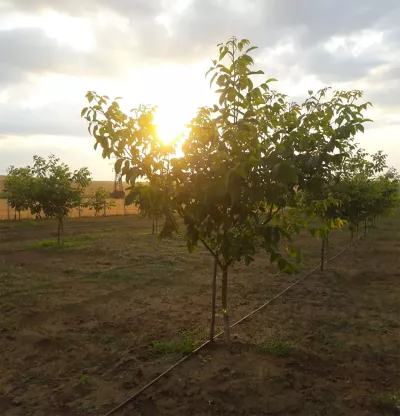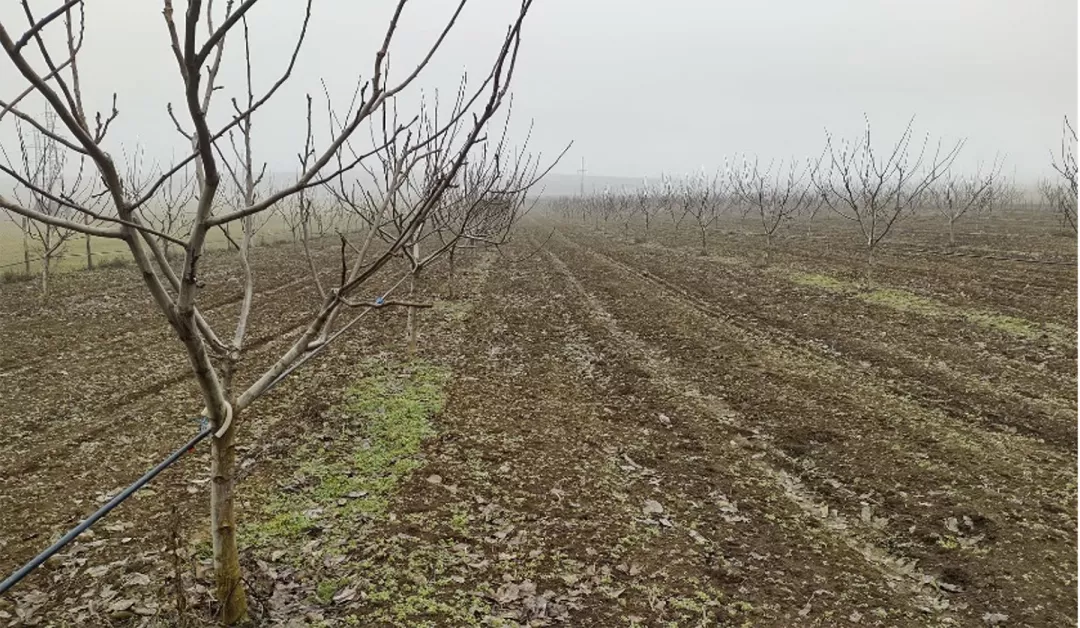General information
RDP Priority
- P2. Competitiveness
RDP Focus Area
- 2A: Farm’s performance, restructuring & modernisation
RDP Measure
- M04: Investments in physical assets
Beneficiary type
- Farmer / land manager
Summary
This European Agricultural Fund for Rural Development (EAFRD) funded project supported the extension and modernisation of a walnut farm in Isaccea, Romania. The ambition was to increase the competitiveness and market reach of the farm and obtain organic certification. All application and project implementation tasks were successfully coordinated by the farmer, Neculai Stefan. This included obtaining all the required approvals, procuring the necessary equipment and walnut seedlings and constructing a range of modernisation works, such as improving water management, renewable energy production and direct marketing approaches. The construction of a new building for the processing site, retail store, storage and farm office, among other functions, completed the project. All activities were effectively implemented according to the business plan with a long-term vision.
The project was also instrumental in initiating important business development aspects such as the creation of short supply chains to foster cooperation, sales and supply, and the development of superior processed sophisticated products (walnut oil).
Results
- A newly established walnut plantation of 2.6 hectares.
- A completed programme of planting and installation works modernised and extended the farm, including an on-site processing site, a drilled well, a water basin and a 750/400 kW Isaccea transformer station.
- An effective management system was installed, including relevant methods for plantation maintenance and harvesting.
- A fully operational walnut production processing site was created supporting hygienic and safe processing of walnuts.

Promoter
Neculai Ștefan
Funding
Total budget: 423 077 (EUR)
EAFRD: 323 653 (EUR)
National/Regional: 57 115 (EUR)
Private/Own: 42 309 (EUR)
Resources
Documents
Context
The story began in 2017 when farmer Neculai Ștefan informed himself about new developments and identified walnut plantations as a viable and long-term investment opportunity. He decided to acquire the relevant knowledge and planted a French variety of walnut saplings across an area of 3.7 hectares. Neculai’s farm is located in Isaccea, a town in Romania's Tulcea County, amidst an excellent quality agricultural area. The town is part of the Association for the Intercommunity Development ITI Danube Delta which supports the implementation of an Integrated Sustainable Development Strategy of the Danube Delta. The strategy provides the long-term vision for the area as a "living delta, with balanced support for the environment and its communities”, focusing on the preservation of the unique natural and environmental resources of the delta and on developing a sustainable local economy. Over the years, and due to its high-quality environmental conditions, Isaccea has attracted more than ten organic farmers/producers to grow a wide range of products.
A few years after his initial plantation, Neculai sought to modernise his walnut farm in a number of areas including the on-farm processing of walnuts, fencing of the area, water management, energy sourcing and marketing approaches. In addition to improving the competitiveness of his farm, the farmer was keen to expand the plantations by 2.6 hectares. His ambition was to become a certified producer of organic products and expand his domestic and European markets.
Objectives
The overall purpose of the EAFRD-funded project was to modernise the farm, extend the walnut plantations and become more competitive. In detail, the objectives were to establish and expand the existing plantation and to increase competitiveness by equipping the farm with a drainage basin and essential machinery and modernising the production process. A particular aim was to add value by supporting the on-site processing of walnuts and attaining direct marketing know-how.
In addition, the new investments were to reduce the farm's production costs by producing and using energy from renewable sources obtained within the farm. Finally, the farmer sought to obtain the relevant certification for his organic produce.
Activities
The project applicant coordinated all phases of the application and implementation process himself.
This included arranging for a feasibility study and a business plan as part of the application, which informed the entire project implementation process.
At the outset, all necessary approvals were obtained, such as from the coastal basin administration for the extension of the walnut plantation by 2.6 hectares, the construction of a processing site, a drilled well, a water drainage basin and a 750/400 kW Isaccea transformer station.
Based on the approvals, the actual work on the plantation started in January 2020. This involved preparing the ground of the new, extended plantation site to a depth of 50-60 centimetres. This was done with the help of a reversible plough, then ploughing to a depth of 30 centimetres and later levelling by ploughing.
Another important activity at the beginning of the project was procuring and purchasing the planting material (walnut seedlings) from France and all the required equipment.
Following the preparation of the site and all the necessary acquisitions, the physical installations involved the planting of the trees and a number of construction tasks, including drilling the well, putting up the fence, installing the drainable basin with the necessary connections and constructing the building for walnut processing. The following processing lines were created: walnut washing line, walnut drying line, nut calibration line, nut cracking and core selection line. The new building also provided space for a retail store, a farmer's office, space for storage and changing rooms for employees.
Further project activities focused on three important business developments. The first centred around obtaining ecological product certification for the farm's walnut production. Secondly, direct marketing of the production at the local level, focusing on short supply chains, needed to be initiated. Thirdly, marketing research was conducted regarding entering the niche market of walnut oil, a product highly appreciated for its qualities.
All project work was successfully completed by October 2022.
Main results
- A newly established walnut plantation of 2.6 hectares.
- A completed programme of planting and installation works modernised and extended the farm, including an on-site processing site, a drilled well, a water basin and a 750/400 kW Isaccea transformer station.
- An effective management system was installed, including relevant methods for plantation maintenance and harvesting.
- A fully operational walnut production processing site was created to support the hygienic and safe processing of walnuts. The site also accommodated an open building for sheltering field equipment and the nut washing line, a retail store, a farmer's office, storage space and a changing room for employees.
- Since October 2023, the farmer has been a certified producer of ecological products, selling successfully on the Romanian and European markets.
- The project is expected to create up to three permanent jobs (FTEs) and temporary positions in the foreseeable future. An emphasis will be placed on hiring local people and all permanent staff will receive training for their specific jobs.
- Discussions regarding the development of short supply chains were initiated and the farm store was operational.
- In addition, the planning process for entering the niche market of walnut oil was also started.
Key lessons
- A walnut plantation is an attractive business for those who want to start a venture in agriculture. A high profit is likely if one is dedicated and prepared to obtain the required knowledge.
- Producing ecological products is a great responsibility for farmers. This approach protects nature and ensures consumer health. In Isaccea and its surrounding area, the number of organic farmers/producers is increasing, thereby generating opportunities to create local cooperatives, share agri-services and encourage local growth.
- In the context of walnut plantations, care needs to be applied to the soil's pH level, as walnut trees require some defining characteristics for a profitable culture. This includes maintaining the optimum soil reaction of 6.0-7.5. Toxicity problems appear above these limits.
It's a beautiful [profession] that gives you perspective. It's good to try not to have prejudices like ‘I won't be able to’, or ‘these projects are made only for the big ones’, and so on. With ambition, good information, and a well-established plan, you can certainly achieve what you set out to do.
